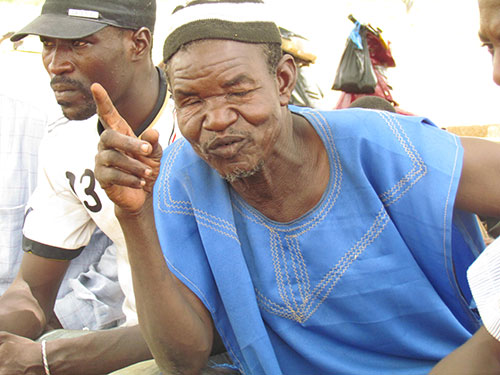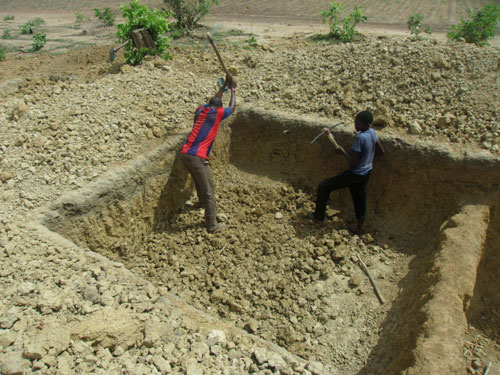Water, Sanitation & Hygiene Education = WASH

We hold these truths to be self-evident:
- Water, Sanitation & Hygiene Education (WASH) are three parts to one whole.
- Clean water alone is not enough to create lasting change and sustainable health improvements.
- Without improved sanitation and the understanding of basic hygiene principles, the cycle of poverty cannot be broken.
- That’s why our work with rural villages in Burkina Faso begins with WASH.
Over the past 10 years BARKA has developed a tried and true methodology for working with rural communities in the WASH domain. It’s a community-led approach that yields sustainable impact and sparks transformative behavioral change. Here’s how we do it:
Assessing Needs and Forming Relationships
BARKA’s most important partner on the ground is the village itself. The greatest mistake of development is that international do-gooders too often parachute into a village, do a needs-assessment , implement a project, and leave. The difference with us is, BARKA stays. We form long-term relationships; in fact we have continued walking side by side with each of the 9 villages where we have implemented projects. We get to know them, we know their names, share meals together often eating out of one common bowl with our hands, we dance and sing together, and sometimes we even become family. This is one of the things that make us different from other NGOs. Large-scale funders might say it’s impossible to scale up this kind of personal approach. We disagree. We believe “sustainable development” must be personal and reciprocal if it’s going to work and also last.

Free, Prior and Informed Consent (FPIC)
In accordance with the Declaration of Rights of Indigenous Peoples, BARKA adheres to the principle of FPIC in all its work. That means that the community as a whole freely agrees to work together on the project, that they fully understand what the project is about and agree with its goals, and that this agreement is made before any work begins.

Good Governance & “Cotisation” (collecting micro-payments)
BARKA assists the village in a self-determined process to elect their own water & sanitation committee. We strive for and communicate the importance of equal representation between men and women. The committee is then trained by BARKA’s “animators” over a period of months and becomes instrumental in taking a leadership role of the community’s new water and sanitation resources. They become responsible for collecting money from everyone who uses the well– micro-payments to pay for future repairs. The water committee is the governance committee, and its holds the key for the sustained success of the project.

Water Accounting
Water accounting is a cutting edge diagnostic tool that provides a scientific basis to determine the best place to drill a well. It involves mapping every single water point in an entire village and comparing this data with population densities. This can be an enormous task because in the eastern region villages are widely dispersed and can span a distance of more than 50 km. This important technique, which utilizes smartphones, GPS, cloud computing and statistical analysis, has become central to BARKA’s approach.

Drilling Wells
Well drilling is often the most exciting aspect of this work. Believe it or not, this is the easy part. The harder part is all the work required to ensure that a village’s well will last a long, long time. That requires education, training, hygienists (who learn how to keep the area around the well clean and properly maintained), maintenance and a financial mechanism to pay for future repairs. In BARKA’s past water projects, we’ve accomplished all this and more.

Building Latrines and Creating Demand for Improved Sanitation
BARKA constructs latrines in village communities and schools, and works to “create demand” for sanitation. Why is this necessary? Because where we work, 97% of the rural population practices open defecation. We have seen this situation rob people of their dignity. It also leads to disease and even premature death that could be otherwise prevented.

Hygiene Education
We like to think of wells and latrines as “hardware” and hygiene education as the “software” or “OS” (operating system) that makes it all work together. Without it, there would be no impact. In a rural village context this work is about creating awareness and stimulating positive behavioral changes that last. That’s not easy when your ancestors have been doing things in a particular way for millennia! BARKA utilizes a wide array of consciousness-raising tools and techniques that include theatre performances, radio broadcasts, games, training sessions and village-wide demonstrations. We work closely with schools, teachers, parents and the local health clinics too.

Maintenance, Monitoring and Evaluation
What is sustainability and how do you create it? What are the keys to long-term results and impact? These are the questions with which BARKA concerns itself. A BARKA project is completed only after the beneficiary partner village has fully taken ownership of the project and has the skills, the means and the know-how to carry it on into the future.
- BARKA provides trainings on how to maintain the well and make light repairs
- We take months to convey the importance of an ongoing financial mechanism, e.g., for all water users to make an annual contribution to the water committee based on the size of their family
- We train the water committee and a group of “hygienists” to serve as change agents within the village and ensure that basic hygiene rules will be followed on an ongoing basis
- After the project, BARKA returns numerous times to observe, to interview villagers and to receive feedback to evaluate what worked and what could be done better next time.
Case Study: Download BARKA’s 2-page document, (download the French Version here) that details the implementation of 2015’s 5-Village WASH Project in Fada N’Gourma.

